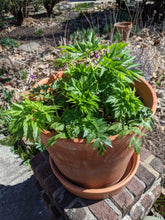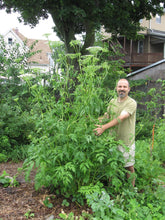Seombadi (Perennial Korean Celery)
Regular price
$4.25
Sale
Dystaenia takesimana
Origin: Ulleongdo Island, South Korea
Improvement Status: Cultivated wild material
Seeds per packet: ~40
Germination tested 3/2023: 50%
Life cycle: Perennial
Known in Korea as seombadi, or sobadi, or dwaejipul, and also called wild celery, Ulleung Giant Celery or Korean Pig Plant, Dystaenia is an exciting perennial plant that has been traveling under the radar In this country for the past few decades but is poised to become much more popular (it has thus far spread mainly in Maine and New England through the MOFGA — Maine Organic Farmers and Gardeners Association — community). It has a somewhat stronger flavor than celery (but not as strong as lovage), makes a great addition to soups, and stays green through even some very harsh winters. It is very nutritious and incredibly cold hardy. As one of its names implies, it has value as a forage plant for animals, but many people love it too.
The plant first came to the notice of non-Koreans after it was collected on Ulleungdo Island, off the coast of South Korea, in 1953 by the famous University of New Hampshire plant breeder Dr. Elwyn Meader. Professor Meader is one of the most important 20th-century figures in the world of plant breeding. He was a generalist who worked with a huge range of species, and his developments include the 'Royalty Purple Pod' green bean, 'Golden Midget' watermelon, 'Prestige' raspberry, 'Sweet Chocolate' pepper, 'Applegreen' eggplant, 'Meader Male' hardy kiwi, 'Reliance' peach, and 'Mericrest' nectarine, among dozens of others. Meader was a deeply religious Quaker, and he was firmly opposed to patenting plant varieties. He also refused to take royalties for his creations, and instead gave them away "as payment for [his] space on the planet." Of his years at UNH, he said "I was working for the taxpayers and the results of my work belonged to them."
Our first stock of this seed came from Eric Toensmeier of Holyoke, Massachusetts, the noted author of books including Paradise Lot, Perennial Vegetables, Edible Forest Gardens, and The Carbon Farming Solution. It was a 2013 lecture by Eric on perennial industrial crops and carbon farming that gave Nate the idea to start EFN! This year's seed was generously donated to us by Jack Kertesz, MOFGA's Landscape Coordinator and founder of the Maine Tree Crop Alliance.
As far as we know there has been precious little breeding work done on this species — a wild plant on Ulleungdo — so it's likely there's room for improvement with respect to flavor, size, growth habit, etc. Let us know if you find any particularly interesting individuals out there!
[Steven Barstow has written a wonderful article about this species, available at this link. Photo shows Eric's friend and colleague Jonathan Bates with some seombadi at "Paradise Lot."]
GROWING TIPS: Germination rates start low and decline quickly, so we recommend planting all of the seeds you receive as it's not worth saving them for another year. Surface sow and keep moist until sprouting (you could try direct-seeding, but we recommend starting in flats or pots). Plant in full sun or partial shade. They prefer cool weather, but will stand up to summer heat once they get going.




